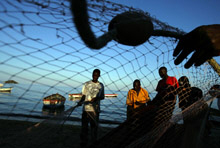
Typical street scene in Santa Ana, El Salvador. (Photo: iStock)
IMF Survey: First Two Countries Tap IMF Shocks Loans, More Expected
December 10, 2008
- Kyrgyz Republic, Malawi get loans under revamped shocks facility
- Increase in food, fuel prices behind both loan requests
- Several other Africa countries expected to request loans
Countries in central Asia and Africa are the first two nations to tap the IMF's revamped borrowing program designed to help low-income countries cope with emergencies caused by events beyond their control.

Fishing nets on Lake Malawi: country adjusting to rapid increases in fuel, fertilizer prices in first part of 2008 (photo: Siphiwe Sibeko/Reuters)
Lending to low-income countries
Several more African nations are expected to request loans in the near future, according to IMF officials.
The IMF's Executive Board on December 10 approved a loan of $100 million for the landlocked, mountainous Kyrgyz Republic in central Asia under the revised Exogenous Shocks Facility (ESF). Previously the Board had approved a one-year $77 million arrangement for Malawi—the first loan since the Board revised the ESF in September.
The 18-month Kyrgyz loan will help the government address several economic shocks, including the rise in commodity prices until mid-2008, a shortfall in hydropower, banking sector difficulties in neighboring Kazakhstan, and an earthquake in the Nura region.
The loan to Malawi, a country in southeast Africa heavily dependent on tobacco exports, will support the authorities in their adjustment to the terms of trade shock caused by rapid increases in fuel and fertilizer prices earlier in the year.
Easier and faster
The ESF was established two years ago to enhance the IMF's ability to help low-income member countries deal with sudden and exogenous shocks. Review of the ESF to make it easier and faster for members to receive the Fund's support was accelerated in light of experience and the worsening of global economic conditions, in particular with the recent episode of surging food and fuel prices that have hit low-income countries particularly hard, an IMF spokesman said.
Revision of the ESF aims to provide assistance more quickly, and in larger amounts, to help low-income IMF members cope with events such as commodity price changes (including oil), natural disasters, and conflicts and crises in neighboring countries that disrupt trade.
The modifications, which went into effect in late November, also streamlined the conditionality—commitments that borrower governments make on their economic and financial policies—attached to the ESF. The changes respond to the request from ministers at the IMF's 2008 Spring Meetings.
IMF's improved lending programs
The revamp of the IMF's shocks facility for low-income countries is part of an effort by the IMF to improve its lending toolkit. In October, the IMF said it was launching a new short-term lending facility to channel funds quickly to emerging markets that have a strong track record, but that need rapid help during the current financial crisis to get them through temporary liquidity problems. For other countries where policy frameworks need strengthening, the IMF has been providing member governments access to traditional lending facilities over longer periods, but on an accelerated basis.
The IMF has launched a review of its financing role in member countries, to make sure it has the right instruments to meet countries' needs in a world characterized by growing—and increasingly complex—cross-border financial flows.
Kyrgyz addressing shocks
The IMF said that a mission team had reached agreement in November with the Kyrgyz authorities on an economic program that aims to address the adverse consequences of the exogenous shocks that have hit the Kyrgyz economy, including the increase in international food and energy prices and the shortfall in domestic power generation due to low water levels in the Toktogul reservoir.
While the focus of the Kyrgyz program is on macroeconomic policies, the authorities will continue to advance their structural reform agenda to improve macroeconomic management and ensure strong growth over the longer term.
The economic program for 2008-09 addresses the consequences of the exogenous shocks and aims to manage the effects on the Kyrgyz economy of the slowdown in regional growth and spillovers from the global financial crisis. The program's objectives are to reduce inflation, sustain economic growth, and protect the poor in the country, which has a population of around 5 million.
Malawi adjusting to price hikes
In Malawi, which has a population of around 15 million, the authorities requested an ESF arrangement to help them to adjust to the terms of trade shocks caused by rapid increases in fuel and fertilizer prices in the first part of 2008.
"Malawi's current low level of international reserves is a concern for financial stability and food security," said IMF Deputy Managing Director Takatoshi Kato.
The economic program to be supported by high-level access to IMF resources under the ESF will help to contain the pressure on the balance of payments and rebuild external reserves, while preserving growth and food security. Financing will be complemented by fiscal and monetary tightening. Additional donor support has been forthcoming, and will be critical to facilitate the economy's adjustment to the terms of trade shock.
"The government's planned reduction in domestic borrowing in 2008-09 is a key element of the fiscal adjustment. To this end, it will be important to enhance fiscal discipline, including through further improvements in public financial management. Spending pressures will need to be resisted, particularly in the runup to the May 2009 general elections, in order to safeguard foreign exchange reserves and priority investments," Kato said.
Comments on this article should be sent to imfsurvey@imf.org







